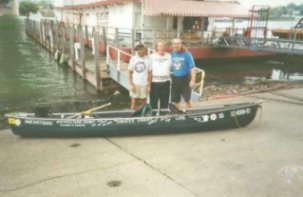

Ohio River Canoe Journey
September, 1999

|
Peacemakers On The Scene |

|
|
Ohio River Canoe Journey |
When you travel our nation’s interstates you will encounter signs that read “adopt a highway” and you think how wonderful it is that a community pitches in for the beautification of the roadways. But, have you ever wondered about our waterways? In September, 1999, 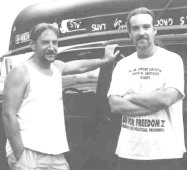 Jim Toren and Jamie Grant set out to canoe the Ohio River in an attempt to chronicle the pollution they would encounter. They began their journey in Pittsburgh, Pennsylvania where the head of the river is found. The confluence of the Allegheny and the Monongahela Rivers creates the Ohio River. It runs its course through Pennsylvania, West Virginia, Kentucky, Ohio and Indiana before reaching the Mississippi in Cairo, Illinois. In the 1700’s the bank of the Ohio River was home to the Shawnee, Miami, Omaha, Erie and Susquehanna peoples. Jim Toren and Jamie Grant set out to canoe the Ohio River in an attempt to chronicle the pollution they would encounter. They began their journey in Pittsburgh, Pennsylvania where the head of the river is found. The confluence of the Allegheny and the Monongahela Rivers creates the Ohio River. It runs its course through Pennsylvania, West Virginia, Kentucky, Ohio and Indiana before reaching the Mississippi in Cairo, Illinois. In the 1700’s the bank of the Ohio River was home to the Shawnee, Miami, Omaha, Erie and Susquehanna peoples.
The journey throughout the first state, Pennsylvania was not an easy one. They set out near Three Rivers Stadium. For twenty miles there were no signs of fish. This created an eerie sensation. In Pennsylvania the river lacked good accesses. John Toren, head of support, found himself sleeping in his truck on the side of the road because of this problem. When accesses were found they were quite unsanitary. 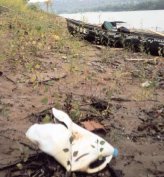 During their stay at one access in East Liverpool, Pennsylvania, Jim and Jamie had to massively dig out an area to pitch camp because of the broken glass, litter and debris. Along the river in Pennsylvania, they passed two facilities that were dumping waste directly into the water. When they passed they noticed the water took on an oily and frothy texture. Not surprisingly, there were dead fish to be found.
During their stay at one access in East Liverpool, Pennsylvania, Jim and Jamie had to massively dig out an area to pitch camp because of the broken glass, litter and debris. Along the river in Pennsylvania, they passed two facilities that were dumping waste directly into the water. When they passed they noticed the water took on an oily and frothy texture. Not surprisingly, there were dead fish to be found.
Once in West Virginia, the accesses were improved. In New Cumberland, West Virginia, crew and support got their wires crossed and were unable to meet. Jim and Jamie encountered good people in this town. The New Cumberland Fire Department opened their facilities to them including their showers. Hot showers at this point had become a luxury. After cleaning up they ventured into town where they ate at Wick’s Restaurant. The people here were beyond kind to them. Hurricane Floyd caused turmoil in the weather and the guys found travel to be hard on some days. One day in particular they found themselves facing extreme winds. It took four and one half hours to canoe five miles. Between paddling against wind and bailing water out of the boat the winds had forced in, well, the efforts were exhausting. They found the results of the last flood to hit the Ohio River area were evident as well. Many accesses had been washed out and had not been replaced yet. One stop was in Glendale, West Virginia where they met Richard Spurlin. He allowed them to use his private dock, camp on his property and even supplied them with firewood. The next morning they found themselves fogged in and getting a very late start. Mr. Spurlin helped them out by telling them they should use the dock where he worked some twenty miles downstream. They did dock at the Spiral Club where Mr. Spurlin worked. Here they met a man who’s great-grandfather had canoed the same stretch of river as Jim and Jamie. He stopped in Proctor, West Virginia and bought a half mile stretch of riverfront property. That is how this family came to live along the river. They also met a woman who carried in her purse a postcard dated some ten years earlier. It was from a man who had canoed the Ohio all the way to Mississippi and then canoed back to Illinois. He had written to her because of the kindness she showed him. The kindness of a stranger can carry a powerful force. 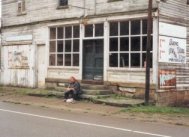 During their journey Jim and Jamie found some river communities shut down and impoverished but the people were rich of spirit.
During their journey Jim and Jamie found some river communities shut down and impoverished but the people were rich of spirit.
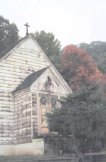 In one such community they met Bill Smith. He was the gentleman who recycled the aluminum in the community.
The people affectionately called him “Beer Can Bill”. He allowed them to camp on his property. It was on this night that Jamie realized his waterproof tent was not waterproof. He had to rip a hole in the floor of the tent to allow the inch of standing water to escape. In one such community they met Bill Smith. He was the gentleman who recycled the aluminum in the community.
The people affectionately called him “Beer Can Bill”. He allowed them to camp on his property. It was on this night that Jamie realized his waterproof tent was not waterproof. He had to rip a hole in the floor of the tent to allow the inch of standing water to escape.
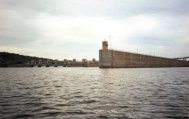 A very scary experience happened at one of the locks. They had once again experienced bad weather and were coping with wind burnt lips when they came to this lock. They rang the bell, which is customary to let the lockmaster know someone needs entry. After a ten minute wait the lock opened and they canoed in and tied off. When they looked back
upstream they noticed a barge which was about a mile away.
A very scary experience happened at one of the locks. They had once again experienced bad weather and were coping with wind burnt lips when they came to this lock. They rang the bell, which is customary to let the lockmaster know someone needs entry. After a ten minute wait the lock opened and they canoed in and tied off. When they looked back
upstream they noticed a barge which was about a mile away.
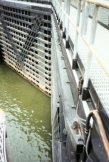 They thought the lockmaster was sending them through before the barge but its approach and the lock not closing made them realize otherwise. The barge came to the very edge of the lock and stopped. Someone on the barge had luckily seen them before entering. The lockmaster did not
even realize that the guys were inside. They thought the lockmaster was sending them through before the barge but its approach and the lock not closing made them realize otherwise. The barge came to the very edge of the lock and stopped. Someone on the barge had luckily seen them before entering. The lockmaster did not
even realize that the guys were inside.
At a stop in a small town, Jim was using the payphone to make his routine calls when he heard Dixie being played on a pipe organ. Looking down the street he saw nothing but desertion (well, desertion and one drunk man staggering from side to side). The “Dixie” echoed down the ghostly road once again. Jim found Jamie and after asking a gentleman they encountered, they were informed it was coming from the riverboats which travel the Ohio River. When the river boats come to the locks they play Dixie to let the lockmaster know they need passage. On a Wednesday night, Jim and Jamie found themselves camping 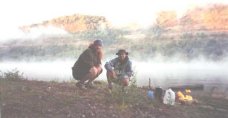 on an island in the middle of the river. It was a state park site and a wildlife refuge. It had been a stop for the underground railroad in days before the abolition of slavery. The railroad aided in the safe passage of many slaves that journeyed to freedom along the riverbank. On this island they encountered a beautiful bird as large as an eagle. It would dive into the river for fish. The sight was breathtaking. There were swimming squirrels and raccoons as well. The raccoons invaded the camp and foraged through the canoe, but left it no worse for the wear.
on an island in the middle of the river. It was a state park site and a wildlife refuge. It had been a stop for the underground railroad in days before the abolition of slavery. The railroad aided in the safe passage of many slaves that journeyed to freedom along the riverbank. On this island they encountered a beautiful bird as large as an eagle. It would dive into the river for fish. The sight was breathtaking. There were swimming squirrels and raccoons as well. The raccoons invaded the camp and foraged through the canoe, but left it no worse for the wear.
When they reached the Cajun Restaurant Showboat and Marina in Huntington, West Virginia, it had been six days since Jim and Jamie had a shower. They were forced, due to complications beyond their control, to walk six miles to a YMCA which had facilities. Jim was found chanting “My kingdom for a shower” (of course his kingdom at that point consisted of one boat, one tent and a camera...).  Paddling through South Point, Ohio (the home of the Fleet Harbor Oil Companies) they noticed the absence of wildlife. In eight miles of river they only encountered eight cranes (no fish, insects, etc).
Paddling through South Point, Ohio (the home of the Fleet Harbor Oil Companies) they noticed the absence of wildlife. In eight miles of river they only encountered eight cranes (no fish, insects, etc).
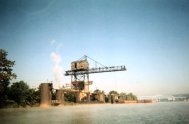 They paddled on to Ashland, Kentucky and then on to Greenup, Kentucky. Here they stayed at Holiday Point Marina. George, a 71 year old man, was the
keeper of this marina. He found them a flat piece of ground to camp on (a first to that point of the trip). George belonged to a group of people who traveled the river ways via Sea Doos. There were about twenty in the group. They made a trip at least once a year and the last had been from Chicago to Cairo, Ill. They once traveled from Greenup, Ky to
Florida . They could get up to 150 miles per day (causing great envy in Jim and Jamie who averaged 20-35 miles per day).
They paddled on to Ashland, Kentucky and then on to Greenup, Kentucky. Here they stayed at Holiday Point Marina. George, a 71 year old man, was the
keeper of this marina. He found them a flat piece of ground to camp on (a first to that point of the trip). George belonged to a group of people who traveled the river ways via Sea Doos. There were about twenty in the group. They made a trip at least once a year and the last had been from Chicago to Cairo, Ill. They once traveled from Greenup, Ky to
Florida . They could get up to 150 miles per day (causing great envy in Jim and Jamie who averaged 20-35 miles per day).
While traveling on, they realized the Army Corps of Engineers had not updated maps in some years for this section of the world. Using the Corps’ map they searched for Fullerton as a stay over when they were informed this town had not existed in over fifty years. After traveling through Buena Vista, Ohio the guys noticed loons on the water. The funny thing was, when they would try to get close enough to look at the loons the birds darted under water and were gone. They never flew away, just swam away. They stopped at Brush Creek Island for a rest. The island had a sandbar that was the length of a football field. You could walk out into the river a good distance and the water was never above your knees. Outside of Manchester, they stayed at the ALS sponsor’s cabin. They were able to take showers, eat a good meal and sleep in real beds. Dave and Barb Detrick must have seemed like angels at that point for allowing them the use of the cabin. After pulling out of Manchester, the guys saw a flock of over twenty herons. They had previously seen one or two but not an entire flock of this magnitude. Jamie found a nice feather specimen from the beautiful birds to put in his collection, which he wore on his hat. Through the last miles of the journey they met some great people. One man, Danny allowed them free stay at his facilities, a woman named Chris (with a dog named Chipper) brought them some great homemade fudge), the Jones’ were kind enough to allow them a stay at their residence. The journey to Cincinnati from Pittsburgh had been a long one. The weather and injuries sustained made them realize they needed to halt the journey in Cincinnati. Jim does intend on picking up there and continuing to Cairo, Illinois at a future date. I have left off the pollution count to the end. The trip Jim and Jamie made was tremendous in and of itself, the people ranged from the nicest people imaginable to the meanest bigots around (which I chose to leave out, I hope to make the writing of this journey a positive one). The pollution they encountered was staggering. The count follows (not in any particular order): * 2,777 tires * 84+ abandoned barges * 4 bath tubs * 16 refrigerators * 69 large metal cabinets * 10 stoves * 6 washers * 1 whole truck * 2 car seats * 13 grocery carts * 2 propane tanks * 1 filing cabinet * 2 pool filters * 5 couches * 1 van seat * 3 gas tanks * 1 refueling tank (marina style) * 1 entire cabin roof * 1 tug boat (partially sunk) * 5 sinks * 2 dish washers * 1 fuel drum * 1 mattress * 4 furnaces * 1 truck bed * 2 bass boats (both partially sunk) * 9 hot water heaters * 1 car Written By Michelle Abott By telephoned reports with Jim Toren |
Participants |
|